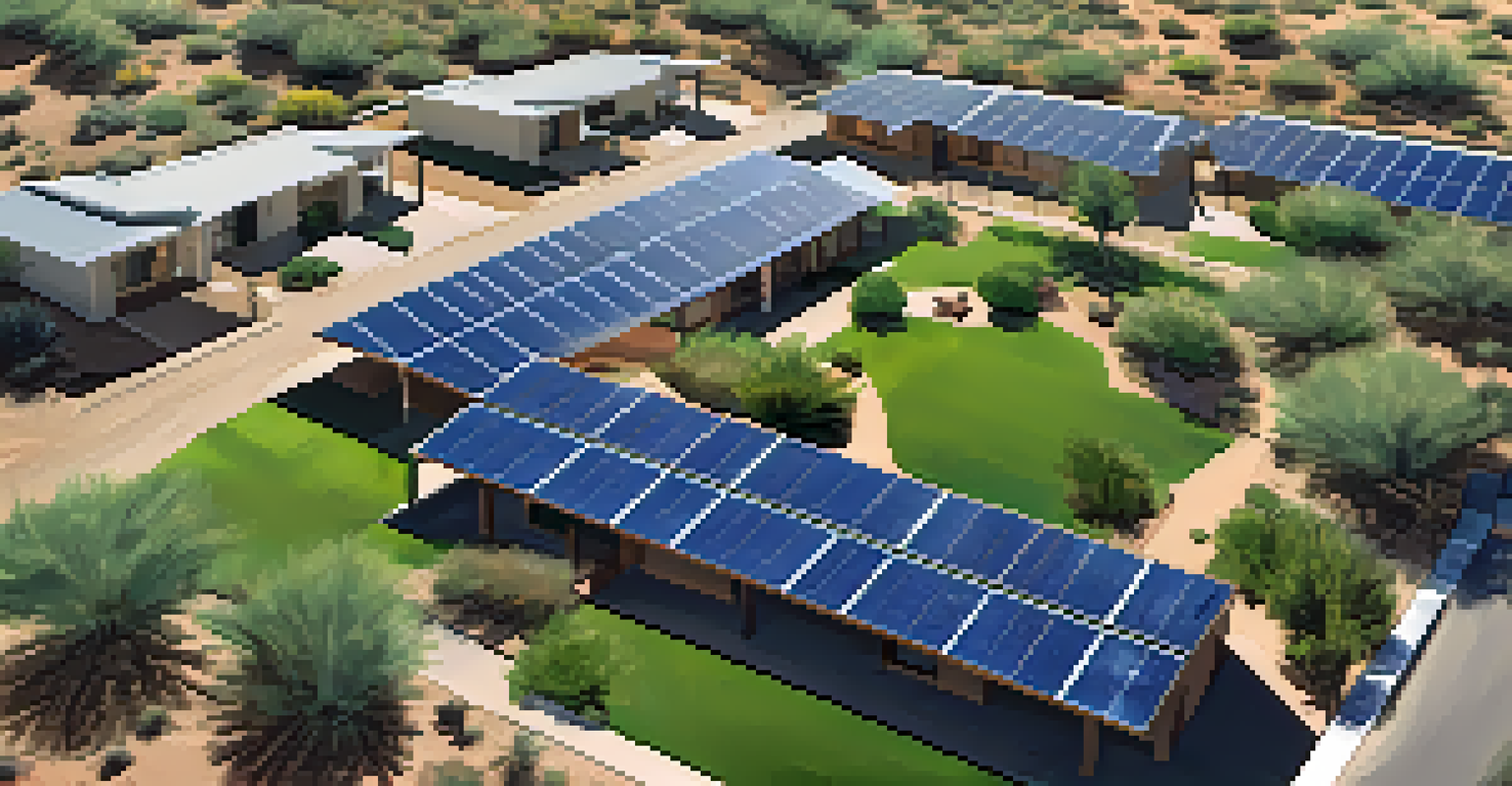Understanding Tucson's Water Conservation Challenges and Solutions

The Importance of Water Conservation in Tucson's Arid Climate
Tucson, nestled in the heart of the Sonoran Desert, faces unique water conservation challenges. With a climate characterized by low rainfall and high evaporation rates, every drop of water is precious. Understanding the significance of water conservation is crucial for sustaining both the environment and the community's needs.
Water is the driving force of all nature.
The reliance on the Colorado River and local groundwater sources makes Tucson particularly vulnerable to drought. As water levels fluctuate and demand increases, the urgency for effective conservation becomes clear. Residents must recognize their role in protecting this vital resource.
Adopting a mindset of conservation not only helps the environment but also fosters a sense of community responsibility. By working together, Tucsonans can ensure a sustainable future, making it essential to understand and address these challenges.
Current Water Supply Sources in Tucson
Tucson's water supply is a blend of surface water from the Colorado River and groundwater sourced from the Tucson aquifer. This combination aims to meet the demands of a growing population, but it comes with its own set of challenges. Over-reliance on these sources can lead to depletion and sustainability concerns.

The city has made strides in utilizing recycled water for non-potable uses, which serves as an innovative solution to extend existing supplies. This practice reduces the pressure on natural water sources while providing an alternative for irrigation and industrial purposes. However, the public still needs to embrace and understand the benefits of using recycled water.
Water Conservation is Essential
Tucson's arid climate and reliance on limited water sources make conservation critical for sustainability.
While current sources sustain Tucson, the reality is that they are not infinite. As the population continues to grow and climate conditions evolve, diversifying water sources will be crucial for long-term sustainability.
Impact of Climate Change on Tucson's Water Resources
Climate change poses a significant threat to Tucson's water availability. Rising temperatures and shifting precipitation patterns can lead to longer drought periods and increased evaporation rates. This means that the already limited water resources could dwindle even further.
The greatest threat to our planet is the belief that someone else will save it.
Moreover, the frequency of extreme weather events, such as heavy storms followed by dry spells, complicates water management. These fluctuations can overwhelm infrastructure and lead to water quality issues, making it essential to adapt our strategies to these new realities.
Tucson must take proactive measures to mitigate these impacts, including investing in infrastructure improvements and adopting sustainable practices. By addressing climate change's influence on water resources, the city can better prepare for future challenges.
Community Engagement in Water Conservation Efforts
Engaging the community is vital for effective water conservation in Tucson. Local initiatives, such as educational programs and workshops, play a crucial role in raising awareness about water issues. When residents understand their water consumption's impact, they are more likely to adopt sustainable practices.
Community involvement can also manifest through efforts like neighborhood rainwater harvesting programs or xeriscaping projects. These initiatives not only reduce water usage but also foster a sense of camaraderie among residents. When people collaborate on conservation efforts, it strengthens community ties.
Community Involvement Matters
Engaging residents in water conservation initiatives fosters a sense of responsibility and strengthens community ties.
Involving the community in water conservation creates a shared sense of responsibility and urgency. By working together, Tucsonans can make a meaningful difference in preserving their water resources for future generations.
Innovative Technologies for Water Conservation
Technological advancements are playing a pivotal role in Tucson's water conservation efforts. Smart irrigation systems, for example, adjust watering schedules based on real-time weather data, significantly reducing water waste. These innovations help residents maintain their landscapes while being mindful of their water consumption.
Another exciting development is the use of water sensors that monitor soil moisture levels, notifying homeowners when it's time to water. This technology empowers individuals to make informed decisions, further promoting efficient water use. As more residents adopt these tools, the collective impact can be substantial.
Investment in technology not only aids in conservation but also encourages a culture of sustainability. By embracing innovative solutions, Tucson can lead the way in responsible water management and inspire other communities to follow suit.
Government Policies Supporting Water Conservation
Tucson's local government has implemented several policies aimed at promoting water conservation. These initiatives include rebates for water-efficient appliances and incentives for xeriscaping, which encourages residents to reduce water usage in landscaping. Such policies motivate homeowners to make environmentally friendly choices.
Additionally, regulations surrounding water usage during drought conditions help manage resources effectively. By setting restrictions on outdoor watering and encouraging indoor conservation, the city can ensure that water is allocated wisely during critical times. These measures reflect a proactive approach to water management.
Innovative Solutions for Sustainability
Adopting advanced technologies and government policies can significantly enhance Tucson's water management efforts.
Collaboration between government entities, organizations, and the community is essential for the success of these policies. When everyone works together, Tucson can create a comprehensive framework that supports long-term water conservation goals.
Future Outlook: Sustainable Water Management in Tucson
The future of water management in Tucson hinges on sustainability and innovation. As the city grapples with increasing demand and environmental challenges, it must prioritize strategies that ensure a reliable water supply. This includes investing in infrastructure, adopting new technologies, and fostering community involvement.
Moreover, public awareness campaigns can play a crucial role in shifting attitudes and behaviors surrounding water usage. By encouraging residents to take small, actionable steps, Tucson can build a culture of conservation that becomes second nature to its citizens.

Ultimately, Tucson has the opportunity to become a model for sustainable water management in arid regions. With a collective commitment to conservation, the city can navigate its challenges and secure its water future for generations to come.